Culture, Community, and the Classroom workshop explores culturally responsive, engaged learning through local traditional arts. It introduces concepts of cultural identity and opportunities to practice ethnographic research skills such as interviewing, note taking, and sketching. The workshop offers educators a widening perspective of their own cultural identity and models for their students to explore their cultural identity authentically. How does one’s knowledge of their cultural identity influence their learning?
Hosted by Local Learning and the Mid-Hudson Teacher Center
Join us for CCC 2024
Monday and Tuesday, August 19 & 20, 9am-3pm
New Paltz, NY
For more information, please contact mira@locallearningnetwork.org.
“…I definitely benefited as a teacher and personally – it was a very focused, intentional and well-planned workshop. Great tools and activities! One of the best workshops I’ve ever participated in!”
–2021 Teacher Evaluation
Learn more about the Culture, Community, and the Classroom Professional Development Workshop
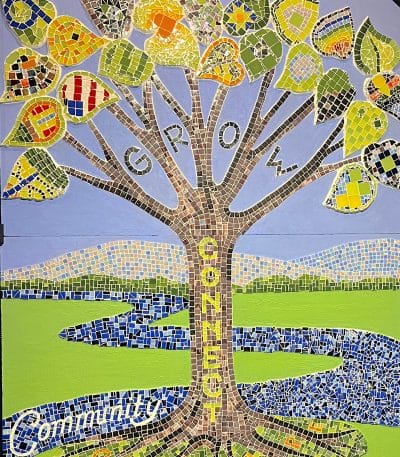
Mosaic made by students with artist Luigi Gobbo. Find the CCC lesson plan when you click on the image.
“I am so grateful that I signed up for this workshop because I learned so much about my community and how to incorporate culture into my classroom. I thoroughly enjoyed this workshop.”
-2020 Teacher Evaluation
Browse selected readings and materials from the training agenda

Teaching Artist George Zavala
“Through art I learned to speak and write in English, language of the land of my birth, and art guided me into this new American culture whose ways and language seemed so different from those of my own Puerto Rican roots. As a young man art became a tool to explore myself and my world and became a vehicle for my political expression. Art is the path to my ancestral heritage and the road to my universal connection with all peoples and cultures.”
-George Zavala, CCC facilitator
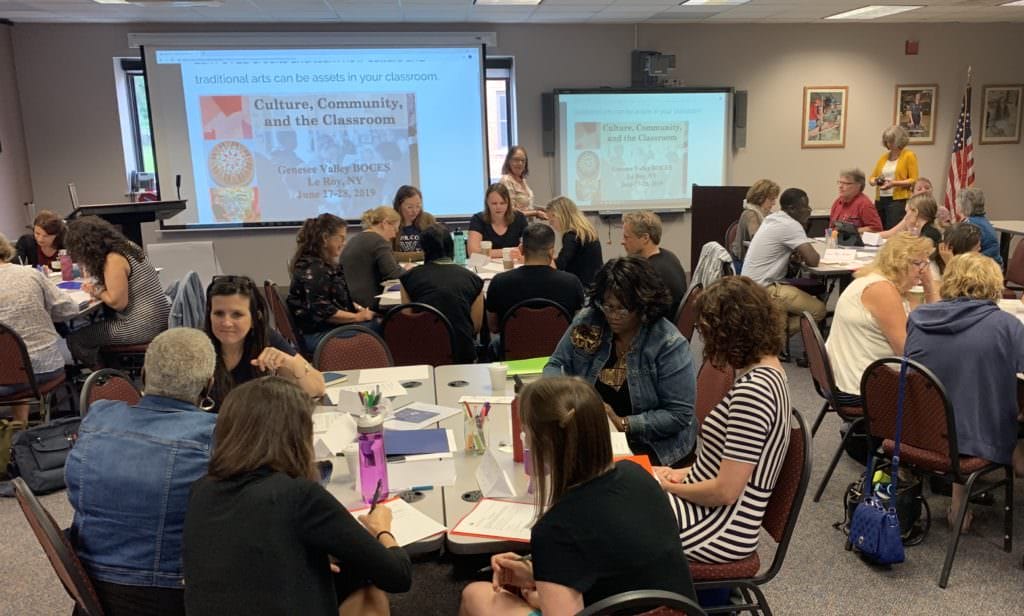
For 30 years Local Learning has provided services to the field of Folk Arts in Education, offering training nationwide. Our New York State series Culture, Community, and the Classroom builds the capacity of excellent local host organizations, teaching artists, and educators for sustainability.
Local Learning: Culture, Community, and the Classroom
Teachers will discover how traditional arts and culture can be assets in your classroom, build inclusive learning plans with proven tools for student engagement, and learn with a cohort model that centers teachers’ expertise.
Folk artists will build your portfolios and gain methods for teaching about your art forms and their context to diverse students of all ages.
Folk and traditional arts are found in every community. Study of traditional arts and their creators contributes not only to students’ understanding of culture and community, but also to their ability to think critically, gather and analyze evidence, and express their ideas and interpretations through personal creativity.
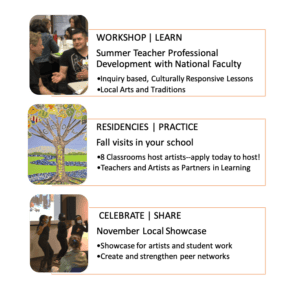
All Educators and Folk Artists are welcome to register for the workshop until space is filled. Additionally, 8 educators will have the opportunity to host a traditional artist for 2 days in your school or online in the fall of 2023 at no cost to you (indicate your interest when you sign up). Participating mini-residency artists represent local traditions of the region. For questions and inquires, contact Mira Johnson at NYnetwork@locallearningnetwork.org.
OBJECTIVES: Our measurable learning objectives of the goals above reflect what participants will know and be able to do as a result of this professional development training. Teachers, Museum Educators, and Artists will…
- Define folk arts and folklife through uncovering personal and local traditions;
- Practice using ethnographic tools of folklife such as interviewing, note taking, sketching, and mapping;
- Demonstrate their own cultural knowledge through creative activities that they can replicate in the classroom so students can explore their cultural identity;
- Examine the ethical considerations of representing diverse cultures in a classroom;
- Practice how to moderate “tough” conversations that folk arts activities may provoke (race, class, immigration status, family crisis);
- Access local and national interdisciplinary resources for artists and educators to integrate folk arts into classroom curricula and activities;
- Connect local folk arts traditions and research (ethnography) to education standards;
- Phase 2 educators and artists will create a classroom-ready lesson plan that uses the materials and knowledge collected through a Local Learning discovery process.
Workshop faculty will include highly experienced folklorists and teaching artists who will lead hands-on sessions in interdisciplinary activities easily replicated in K-12 and museum teaching. (Meet the Faculty)
Participants will use and receive resources produced by Local Learning, City Lore, and other folk arts education organizations around the country. (Browse Selected Resources)
Meet the Faculty
The workshop facilitators include national and state curriculum experts, master teachers, and museum educators. The Albany (A) and Binghamton (B) workshop facilitators are indicated at the end of each bio.
Paddy Bowman is Founding Director of Local Learning and co-edits the Journal of Folklore and Education. Educators and traditional artists around the nation have benefited from her ability to connect non-folklorists with our discipline. Her influential university courses and professional development training programs in folklore for educators around the country, implementation of model school-based projects, authorship of seminal publications, and development of online and off-line curricular materials have significantly extended the reach of folklore to hundreds of teachers and thousands of students throughout the United States. She co-edited Through the Schoolhouse Door: Folklore, Community, Curriculum (2011) and co-wrote a chapter in Folklife and Museums. She was awarded the American Folklore Society Benjamin A. Botkin Prize for Lifetime Achievement in Public Folklore and is a Fellow of the American Folklore Society. She has an MA in Folklore from the University of North Carolina. (A)
Karen Canning is the founding Director GLOW Traditions, a regional traditional arts and folklife program for Genesee, Livingston, Orleans and Wyoming counties in western New York. The program was established in 1997 as a shared program by the counties’ arts councils. She frequently collaborates with community, educational, business and civic entities to document and present diverse folk arts of our region such as Hispanic holiday traditions, American folk music, world dance traditions, Native American arts, and occupational folklore. Canning’s work as a visiting folklorist educator in schools includes residencies and presentations of Mexican holiday traditions, traditional American music and dance, Trinidadian steel band music and history, and occupational folklore of a local salt mine. She has developed school residencies with regional tradition bearers representing diverse ethnic backgrounds, in music, dance and foodways.
Maxwell Kofi Donkor is a Master drummer and Asante Prince who was born and raised in Ghana. Kofi was chosen to carry on the ancestral drumming tradition, and spent much of his childhood learning drumming from his grandfather. He has honored and pursued this commitment with a passion throughout his life. Kofi now lives and works in New York State where he is the leader of the Sankofa Drum and Dance Ensemble. The group promotes teamwork and community building through their performances and workshops at events, schools and festivals.
T.C. Owens is the Folk Arts Coordinator at The ARTS Council of the Southern Finger Lakes. As a folklorist and videographer, for the past decade he has worked collaboratively to document, preserve and present the vital traditions of everyday people and their communities. He holds an MA in Folklore from the University of North Carolina at Chapel Hill. He has worked at the Philadelphia Folklore Project, Media Mobilizing Project, and as a contract folklorist for the Northern Tier Cultural Alliance and the Pennsylvania Council on the Arts in Northeast Pennsylvania, where he grew up. He is also a director and producer of the documentary short, Our Side: The Other Atlantic City.
Lisa Rathje is Executive Director of Local Learning: The National Network for Folk Arts in Education and co-edits the peer-reviewed, multimedia Journal of Folklore and Education. She directs teacher and artist training institutes and advocates for the inclusion of culture in diverse learning spaces. She consults nationally, including currently a 5-year consultancy for the REACH (Race, Equity, Art, & Cultural Heritage) program of the University of South Florida funded by the U.S. Department of Education to strengthen arts and culture programming in the nation’s educational system. Rathje also has taught courses on cultural partnerships and fieldwork in the Goucher College Masters in Cultural Sustainability degree program, and has multiple publication and film credits. She serves on two Arts Education Partnership National Working Groups: Equity and Higher Education Partnerships. Rathje received her PhD in English with a concentration in Folklore from the University of Missouri. (A,B)
George Zavala practices a number of art forms and has been a teaching artist with folk arts organizations such as City Lore and Mind-Builders. “Since my early childhood I have been drawn to art and have always been fascinated by the diverse and unique forms through which it communicates. Through art I learned to speak and write in English, language of the land of my birth, and art guided me into this new American culture whose ways and language seemed so different from those of my own Puerto Rican roots. As a young man art became a tool to explore myself and my world and became a vehicle for my political expression. Art is the path to my ancestral heritage and the road to my universal connection with all peoples and cultures.” (B)
Selected Resources
Find more in our open access Journal of Folklore and Education and our Learning Locally page dedicated to learning activities that can be done at school or home.
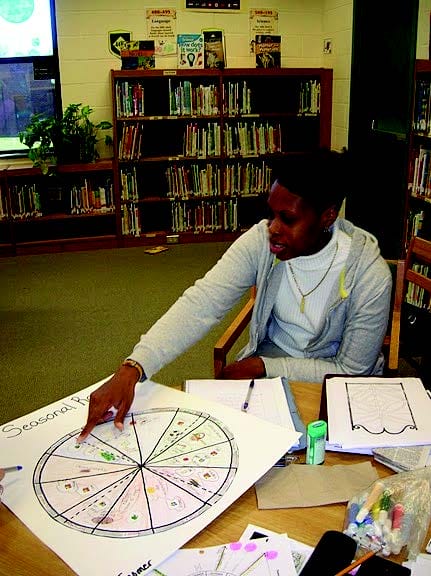
Use theSeasonal Round lesson planto introduce students to your classroom or school culture, as well as their own. Students can learn about themselves, their families, their region, and the world by examining the seasonal round. Find templates and the plan at the link.
American Folklife: A Commonwealth of Cultures
by Mary Hufford
Folklife is community life and values, artfully expressed in myriad interactions. It is universal, diverse, and enduring. It enriches the nation and makes us a commonwealth of cultures. The traditional knowledge and skills required to make a pie crust, plant a garden, arrange a birthday party, or turn a lathe are exchanged in the course of daily living and learned by imitation. It is not simply skills that are transferred in such interactions, but notions about the proper ways to be human at a particular time and place. Whether sung or told, enacted or crafted, traditions are the outcroppings of deep lodes of worldview, knowledge, and wisdom, navigational aids in an ever-fluctuating social world.
Artists’ Letters to Students
by Amanda Dargan
A key challenge for folk artists is how to teach their art in a way that respects the tradition and the cultural values it embodies. How can we convey the complexity of a cultural tradition and make it accessible for even very young students?
An Accessible Aesthetic: The Role of Folk Arts and the Folk Artist in the Curriculum
by Barbara Kirshenblatt-Gimblett
Originally published in New York Folklore: The Journal of the New York Folklore Society
9:3-4 (Winter 1983), pp.9-18.
Folk arts bear witness to the powers of informal learning. Basket making, traditional singing, storytelling, wit and humor in conversation, needlework, cooking, games, and pastimes —these skills are learned in the academies of the street, home, the park, the woods. And the masters are the people rooted in community and history. They acquire their skills for the most part informally from others, and with those skills they acquire deeply felt values, standards of excellence, and a resonant sense of who they are and where they are.
Folklife Education: A Warm Welcome Schools Extend to Communities
by Linda Deafenbaugh
Increasing student participation in school by tapping into their community knowledge supports students’ cultural competency and can positively affect academic achievement.
Local Learning: A Folk Arts Integration Handbook
by Paddy Bowman
Folk arts manifest ways in which the arts enrich our daily lives, dignify our communities, and define our cultural heritage. Every community is blessed with a broad spectrum of folk arts and traditions offering educators an important opportunity to enrich their teaching. Folk artists give students an opportunity to learn with artists who look and sound like themselves, their families, and community members. Students enthusiastically respond to the content of folklore, such as stories, music, dance, crafts, customs, and foodways. They readily embrace folklorists’ methods of collecting and preserving primary sources through observing, interviewing, listening, recording, writing, sketching, mapping, categorizing, quantifying, and analyzing findings. Students also acquire new perspectives about themselves, their culture, and the culture of others. By seeing the continuation of traditions, students tie the past to the present and use and create primary resources.
Learn more about how Folklore in Education connects to Common Core Education Standards here.
Other worksheets referenced during the Professional Development:
Cultural Assumptions, Ethnocentrism, Stereotyping: We look at the world through the lens of our cultural assumptions, often unaware that we are viewing things differently from how others do. Doesn’t everybody do this or think that?Read More…
 Defining Cultural ProcessesRead more about how we define cultural processes and access the Venn Diagram for envisioning the cultural mix.
Defining Cultural ProcessesRead more about how we define cultural processes and access the Venn Diagram for envisioning the cultural mix.
Access more on interviewing, including some worksheets, recommended interviewing guides, and more in our Local Learning Toolbox.
Like our Postcard Museum activity? Learn more here.
Register for Culture, Community, and the Classroom
We are grateful to our local Mid Hudson Teacher Center colleagues, along with Julia Gutierrez, Jim Longbothom, and Kofi Donkor for their help in planning this professional development series. We want to acknowledge the support of Elinor Levy, Ellen McHale and New York Folklore.
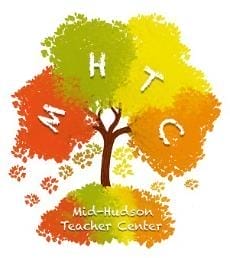
Also, these funders have made it possible to offer this as a free professional development opportunity for teachers and artists: The National Endowment for the Arts and New York State Council on the Arts. Additional funding for this project comes from individual donors to Local Learning.
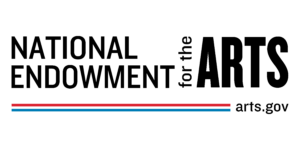
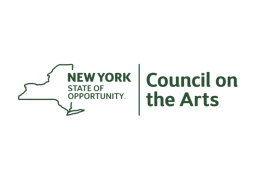
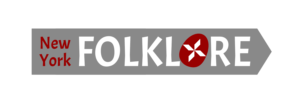
Local Learning’s programs are made possible by the New York State Council on the Arts with the support of the Office of the Governor and the New York State Legislature.
